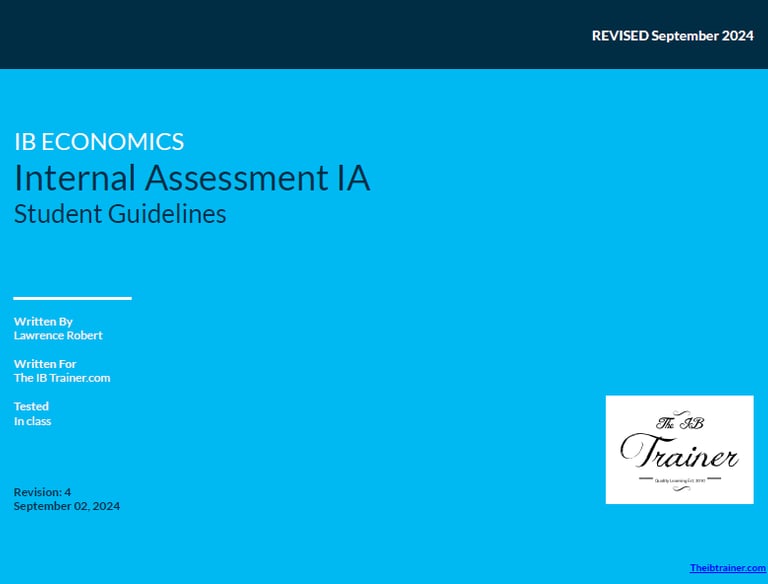
IB Resources: Study Guides, Blog Indexes & Student Tools
Welcome to your central hub for everything IB. Whether you're working on your Internal Assessment, preparing for Paper 3, or just trying to make sense of Micro or Marketing, this page pulls everything together. You'll find study tools, blog indexes, and downloadable guides for both IB Economics and IB Business Management.


IB Economics Resources
Blog Indexes
Introduction to Economics Index
All you need to start your IB Economics course:
1- What is Economic Prosperity?
2- Why You Should Take IB Economics?
4- A Beginner’s Guide to IB Economics
6- Scarcity and Opportunity Cost
7- The Production Possibility Curve PPC / PPF
Microeconomics Index
All our blog posts on elasticity, externalities, consumer choice, market failure, market power and more - with real-life examples and exam-focused explanations.1- Supply
2- Rational Consumer Choice (HL)
6- Price Elasticity of Demand (PED)
7- Demand
10-Income Elasticity of Demand (YED)
11- PES (Price Elasticity of Supply)
12- Balancing the Market Game Price Controls (Part 1)
13- Balancing the Market Game (Part 2): Taxes, Subsidies & Nudges
14- Market Failure
15- Market Failure in Common Pool Resources
16- Externalities
17- Public Goods
18- Asymmetric Information (HL)
19- Market Power Part 1: Perfect Competition
20- Market Power Part 2: How Firms Chase Profit
21- Market Power Part 3: Monopoly and Natural Monopoly
22- Market Power Part 4: Oligopoly, Collusion, and Game Theory
23- Market Power Part 5: Measuring Market Power Monopolistic Competition
24- Price Controls: When Politicians Try to Fix Markets
26- Regulation vs Deregulation
27- The Ultimate Guide to Public Goods
28- Taxation and taxation examples
Blog entries on the IB Economics macroeconomics topics including your favourite topics, fiscal and monetary policies, unemployment, inflation, macroeconomic objectives and more - with real-life examples and exam-focused explanations.
1- Free Markets: Inequality and the Circular Flow
2- Measuring Economics - GDP, GNI and the Circular Flow (Part 1)
3- Measuring Economics Can You Measure Happiness? (Part 2)
6- Macroeconomic Equilibrium - Monetarists vs Keynesians
7- Monetarist vs Keynesian - Economic Policy and Assumptions
8- The Story of Economic Growth
9- Unemployment More Than Just Numbers
10-Unemployment: Why Some Joblessness Is Just Inevitable
11- Inflation
12- Deflation
13- National Debt
15- The Economics of Inequality
18- How Governments Fight Inequality
19- Monetary Policy
21- Fiscal Policy
22- Fiscal Policy Part 2
23- Supply-Side Policies
24- Do Supply-Side Policies Work on Demand?
25- Inflation Part 2
27- Bonds Explained
29- The Minimum Wage
30- The Minimum Wage Debate: Are Good Intentions Enough?
31- Economic Growth
32- Fighting Economic Downturns
33- Productivity and Economic Growth
34- The Labour Market Explained
35- Technology and Economic Growth
36- Does Economic Prosperity Actually Bring Happiness?
37- Corruption
IB Economics Diagrams Programme, What's included:
200+ exam-ready diagrams covering the entire IB Economics syllabus
Video for every diagram showing you exactly how each model looks
Image version perfect for modelling diagrams in you essays, presentations, and your IA
Detailed written explanations of the economic theory behind each diagram
Both SL and HL IB Economics diagrams clearly labelled and organised by topic
Real IB Economics exam application showing how to use diagrams effectively in Paper 1 and Paper 2
Global Economy / International Trade Index
Everything from exchange rates and protectionism to globalisation and economic development - made digestible for IB learners.1- Benefits of International Trade
2- Absolute vs. Comparative Advantage
4- Quotas
5- Subsidies
9- The World Trade Organisation
10- Exchange Rates
11- Fixed Exchange Rates
12- Balance of Payments Part 1
13- Balance of Payments Part 2
14- Balance of Payments Part 3 (HL)
16- More Than Just Money: Economic Development
18- Poverty Traps
19- 10 Roadblocks to Prosperity
20-The Political and Social Roadblocks
21- 10 Epic Strategies for Economic Growth & Development
22-Why Some Economic growth and development Strategies Shine While Others Flop
23- Sustainable Development Goals
24- Globalisation
HL IB Economics Index
Higher Level content on advanced theory, analysis techniques, and exam strategies.SL IB Economics Index
Standard level content, analysis techniques and exam approaches.
Support Guides
Internal Assessment (IA) Guide – Free Download
Step-by-step support on topic selection, structure, evaluation, and common IA mistakes.


IB Economics Podcast Highlights
Visit the Podcast Page and sign up for free
Real-life examples, mini-lessons, and exam-friendly storytelling based on the IB syllabus - with humour designed for IB Economics students.
Every episode of Pint-Sized links back to what matters most for your IB Economics course:
Understanding key IB Economics concepts
Applying them in real-world IB Economics contexts
Building IB Economics course confidence without drowning in dry theory.
Subscribe for free to exclusive episodes designed to boost your IB Economics grades and confidence:
IB Business Management
Master IB Business Management Module 1 Introduction to Business Management
Master IB Business Management Module 2 Human Resource Management
Master IB Business Management Module 3 Finance and Accounts
Master IB Business Management Module 4 Marketing
Master IB Business Management Module 5 Operations Management
IB Resources Hub
Explore comprehensive study guides, tools, and blogs tailored for IB students' success.
Study Guides


Access detailed study guides for various IB subjects to enhance your learning experience.




Student Tools
Explore IB Economics and Business resources - blog indexes, IA guides, EE tools, and study materials to help you master the IB with confidence.
The IB Trainer Blog Index
Explore our curated blog index for valuable insights and tips on IB studies.
© Theibtrainer.com 2012-2026. All rights reserved.
More Basic Resources For IB Students:
Legal
Have a Tip? Send us a tip using our anonymous form
